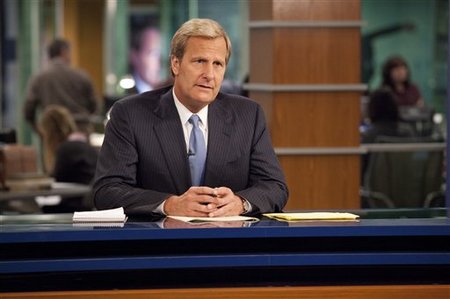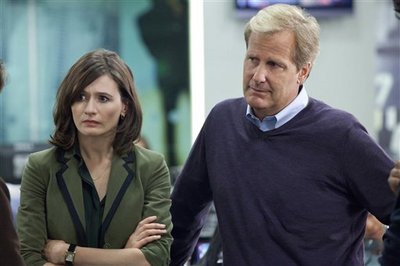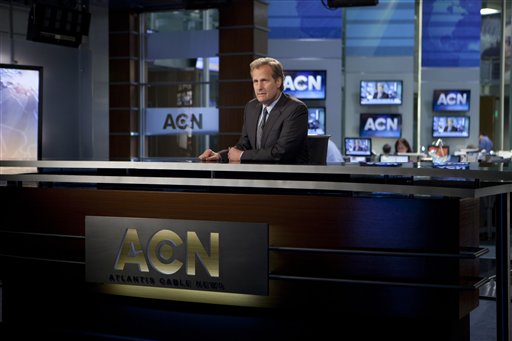Jeff Daniels offers behind-the-scenes glimpse of new HBO series 'The Newsroom'

Jeff Daniels in a scene from "The Newsroom"
HBO
For Daniels now finds himself, if you’ll excuse the pun, the anchor of Aaron Sorkin’s (“The West Wing,” “Sports Night,” “The Social Network”) newest project, an HBO drama called “The Newsroom.”
Daniels plays a moderate Republican cable newsman named Will McAvoy, who’s built a long and successful career by way of simply not offending people. But in the pilot’s opening moments, in an auditorium at Northwestern University, Will—flanked by two screeching partisans—suddenly decides to express his true feelings; and the fallout from his outburst, when he returns to work, is a nearly empty newsroom.
The show boasts an impressive lineup of stars, including Emily Mortimer (“Hugo”), Sam Waterston (“Law and Order”), John Gallagher Jr. (who won a Tony Award for his performance in “Spring Awakening”), Alison Pill (“In Treatment”), Dev Patel (“Slumdog Millionaire”), Olivia Munn (“The Daily Show”), and Thomas Sadoski (Tony nominee for “Reasons to be Pretty”).
Notice several stage actors on this list? Not surprising, since Sorkin graduated college with a degree in musical theater and first found success with the play “A Few Good Men.” (You may notice that references to shows like “Man of La Mancha” and “Little Shop of Horrors” regularly pop up in “The Newsroom”’s first few episodes.)
Daniels began his career on the stage, too, of course; and he recently answered questions from AnnArbor.com about “The Newsroom.” So in keeping with Sorkin’s signature style, just imagine Daniels briskly walking through various hallways and offices while you read his responses.
Q. When and how did you get involved with “The Newsroom”?
PREVIEW
”The Newsroom”
- What: Aaron Sorkin’s new drama focuses on the production of a cable news show that’s striving to restore journalistic integrity on a broad scale, following bland anchorman Will McAvoy’s (Jeff Daniels) public rant.
- When: Sundays at 10 p.m., starting June 24, on HBO.
Q. What made you a good fit for Will McAvoy?
A. I think, from the film end of things, and maybe stage as well, that I’ve made a career out of these flawed heroes. And Aaron loves to write those particular kinds of roles. And he loves complications, he loves characters who are complicated, and certainly recently, with “The Squid and the Whale” and all that, I’ve got a history of it, so I think that made me a candidate. I wasn’t someone who’d created a brand and could only play that.
I was A-Z as far as range went, and I think the comedy thing helped too, because he ended up, over the first season, writing (material) as funny as ever I’ve seen him write. He’s got someone in me, and in the other cast members, who can handle comedy.
Q. Why were you, at this point in your career, looking to venture into television?
A. I’d been doing indies, and when the economy went south, half the distribution companies just folded up. So now it’s even more difficult to get your indie distributed, which is always a battle, because they never have any money. Even with “The Squid and the Whale,” I had to do a dog and pony show all over the country for 5 months, and that gets annoying, to be honest. And I also got tired of the indie thing of, “Can you … come and do this part in our movie, and we’re not going to pay you, but we want your 55 movies of experience.” I just got tired of it.
The (good) writing was really starting to gravitate toward cable, and even at the networks, the writing was getting better and better. … And actors love good writing. So that’s when I said, “If that’s where it is, that’s where I’m going.”
Q. Your co-star in the acclaimed off-Broadway, 2007 production of a play called “Blackbird,” Alison Pill, is part of “The Newsroom” cast. Is that a coincidence?
A. Once I was on, then they began casting everything else, and they certainly asked for my input on people, and I know with Alison in particular—as I told her, “Your middle name is ‘yes.’” She goes, “Why?” “Because when they said ‘Alison,’ it went like this: ‘Alison - yes - Pill.’ She and I really—that “Blackbird” thing was an actors’ foxhole. We were in it together, and I think the world of her. She’s a very, very talented actress.
Q. Did you research past news anchors after learning you’d be taking on this role?
A. I didn’t do anything. Aaron and (executive producer) Alan Poul and the production team had done a very thorough job of researching the set and the mechanics of how a show gets done, and the control room and the communications. … But Sorkin never mentioned anybody. He never said, “Hey, I’ve written it based on so and so.” We never had that conversation. And it really kind of became, let’s try to create a guy that, you could imagine dropping him and his show and his network in the middle of CNN and MSNBC and Fox. And so we thought, let’s create our own guy.

Emily Mortimer and Jeff Daniels in "The Newsroom"
HBO
A. The deal with Aaron is, you memorize every word, and you don’t ad-lib, and you don’t paraphrase—which is a huge relief, to be honest. It’s like theater. … The pace is—well, it isn’t slow. It takes a while to get used to … coming around the corner on two wheels. And that’s pretty much what it feels like.
The only way to beat that is to memorize everything you’ve got as far in advance as possible. That was my trick. Every episode took 2 weeks to shoot. I would get a script, we would read it in the beginning of the second week, and then by Thursday or Friday, we had the script for the next episode as we’re finishing whatever episode we’re on. So the weekend was spent memorizing the next episode front to back, so then, as I shot it over the following 2 weeks, as fast as possible, you try to get it to feel like the 100th performance of a play. That’s a different kind of performance than, I just learned it last night, and it looks like it.
So that was the whole thing with Aaron, was to stay ahead of him, usually by several days, and then just pound it leading up to the day of shooting. The thing is, you do that for six months, so it’s a constant overlap. You’ve got a lot of words in your head all the time.
Q. That sounds like it takes a lot of focus.
A. You have no time for anything else. But every actor wants great speeches. Well, you got ‘em. And the trick became the preparation, and everybody did it. … Then there’s—you had to be fearless. You had to be OK with failing miserably. Of not making the turn, and you just don’t know the next line, and the scene just grinds to a halt. Or you completely can’t say the speech, and you can’t get the words right. Partly because the pace is driving you.
However, the trick was to jump off the cliff and start flapping your arms as hard as you could, and hoping you flew a little bit. When that would work, when you jump off that cliff and just go and hope to hell you knew it, it was thrilling. It was just thrilling. … It’s a dangerous way to work, because the standard way is to kind of come in and be very slow about it, very movie star-ish, me and my close-up, but we were—it’s as close to doing a play in front of cameras as I’ve ever done.
Q. Right at the start, you deliver a speech that’s essentially a linchpin for the entire series. Could you tell me about your preparation for that? And how early in the process did you film that scene?
A. You read it, and you’re just going, “I get to say this?” … I think we shot that on day 4 of an 18-day shoot on the pilot. … And the pressure was on. HBO had people there, Aaron was amped up about it, everybody—and you know. I’ve been around.
You look at the pilot, and it’s the first thing up. So when America’s sitting there with their remote control, wondering if they want to stick around for this thing or not, well, let’s see what happens in the first 10 minutes. And (Sorkin) smartly placed it right there. He had really worked hard on that speech, and it locked in, from the writing end, about five days ahead. And so I’d memorized it several times as it changed.
It reminded me of the speech in “Gettysburg” to the guys on the hill, the importance of it, and I knew, if I did it well, it could last. People would talk about it for a long time, it was so well written. So we shot it at about 2 in the afternoon. They turned the cameras on me, and they said, “All right. You ready? Go.” … And we were in front of 500 college kids, and they applauded at the end. That’s unusual. And Aaron came over and said, “Well, you’re pitching a no-hitter, so I’m not going to talk to you.” And he turned around and walked away.
That was a … great kind of rallying cry, to be honest, from me, but also for me, for Aaron, for the show. Everybody at that point knew they had something, because everybody showed up for work after that, including me.
Q. In the pilot, Will is pejoratively referred to as the Jay Leno of the news business—the safe, bland, inoffensive choice. Does this make promoting and marketing the show tricky, when you might want to get booked on “The Tonight Show”?
A. Jay’s a big boy. He can take that kind of thing. But I’m actually doing Letterman on Tuesday (June 19). And once you do one, you don’t do the other.
Jenn McKee is the entertainment digital journalist for AnnArbor.com. Reach her at jennmckee@annarbor.com or 734-623-2546, and follow her on Twitter @jennmckee.



Comments
Birdie
Thu, Jun 21, 2012 : 5:51 p.m.
"I was A-Z as far as range went, and I think the comedy thing helped too, because he ended up, over the first season, writing (material) as funny as ever I've seen him write. He's got someone in me, and in the other cast members, who can handle comedy." not a real humble guy is he?
leaguebus
Thu, Jun 28, 2012 : 2:30 a.m.
Jeff is a great actor. Dumb and Dumber is as funny as a movie gets. Plus he looked great with a comedic genius like Jim Carey.
Ross
Thu, Jun 21, 2012 : 6:41 p.m.
No, he's not. At all. Kind of an arrogant and offensive dude - better to ignore the inetrviews and just enjoy his acting, which is quite good.
Birdie
Thu, Jun 21, 2012 : 5:50 p.m.
Hummm
justcary
Thu, Jun 21, 2012 : 2:43 p.m.
This looks GREAT! I'll be home Sunday night tuning in.